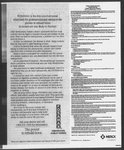| OCR Text |
Show SURGERY CAN BE AN INTIMIDATING EXPERIENCE. HERE'S WHAT YOU NEED TO KNOW... BeforeYou Go Into[he Hospital | G GET a secondopinion. G MEET your surgeon ahead of time: Take notes. G FIND OUT your hospital’s success rate with than ever, patients need to know whatto expect and howto cope with it. The health-care industry is in a period oftransition, and soaring costs have forced many hospitalsto lay’ medicaltests and shorter hospital stays. What'sa patient to do? Thefirst step! is to get over the awe in which most people hold the medical profession and } become a smart consumer, Makebelieve” you're buying a new car and approach hospitalization as a customer who knows what he orshe wants and expectstogetit. “Tt is more and more important for} patients to become their own health managers—partners with their doctors,” says Dr. Jack Lord, a senior adviser to the American Hospital Association. “You mustnotbe just a potato in a bed that people are doing things to.” Thefollowing suggestionsare based on interviews with experts at university’ hospitals, medical associations,lawyers, governmentofficials and patients. the procedure. G GIVE youranesthesiologist your medical WIT colina f& DISCUSS allergic reactions you’ve had— in advance. & KNOW WHO will be in charg > of your stay at every stage. G DON’T SIGN advanced directives until you absolutely understand your treatment options. 8 Ne SM elem lem elt mEiy in an emergency {& KEEP ACCURATE RECORDS, starting with your diagnosis, in case of a problem with your billing or insurance. 8 NS eneeh Ne teen el tom ae IS THIS TRIP NECESSARY? CHOOSING THE SURGEON ‘our family doctor may unknowingly send you to the wrong surgeon.Insist upona personal meeting with the surgeon far ahead ofthe operation.If he or she refuses, find another surgeon: Thisis a decisiontoo importantto be left to chance. Don’t risk forgetting what the surgeon tells you. Take along a tape recorder, as well as a notepadin case the recorder fails. Ask how many of your kind ofoperation the surgeon has performed and the success rate. (The hospital's patient representative can help you confirm this.) As a rule of thumb, 10 operations is a minimum forrare surgery like an organ transplant, 200 for the much more commoncoronary-artery bypass. Check The Official ABMSDirectoryofBoard Certified Medical Specialists at your library to make sure your surgeon has passed the examinationforhis or herspecialty and been board-certified. At this meeting, you'll also want acommitmentthat your surgeonwill perform the operation, not simply getit started, turn it over to an assisting doctor and move on to another scheduled procedure. Some surgeonsactually dothat. Andbefore yousign up, check out the hospital the surgeon wants to put youin. CHOOSING THE HOSPITAL Wie yourdoctor wants to book you into a hospital for surgery, get a second opinion—and make sure¥ the second doctor has no connections with thefirst. Ask yourfriends for recommendations; I your nearest med-§ ical school. There maybe waysto avoid’ surgery, and many ailments that once: required hospitalization can now be done outside, such as chemotherapy or cataract surgery. ‘our doctor and/or surgeon will want to send you to the hospitals where they are onstaff. Your HMO may want to send you to the hospitalsthat chargetheleast. But somehospitals are better than others—notjust in comfort or atmosphere butalso in termsoftheir medical record. Ifyou have a garden-variety condition— a hernia needsrepairor a child needs to be born—most community hospitals will BY CA Ker SB ReN PAGE 6: MAY 4, 1907 - PARADE MAGAZINE |




































































































































































































































































































































































































































































































































































